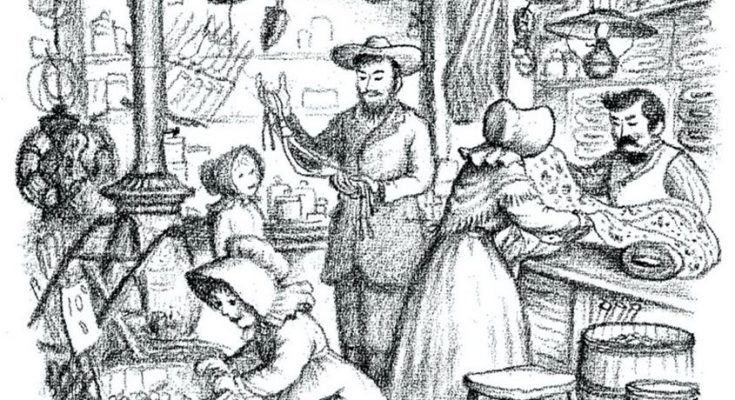Garth Williams (American, 1912-1996), “A Trip to the Store”, in Little House in the Big Woods (Laura Ingalls Wilder), 1953
A moral management of the household money
The mercantile, a space of wonder and excitement for the little girl Laura Ingalls Wilder in the face of the textiles, foods, and other treasures that this place of everyday life holds for the pioneers. Many studies have been carried out on Ingalls’ work, but none have yet dealt with the moral management of money within it. Little House on the Prairie contains the strong imprint of a virtuous upbringing of Childhood, an education which is expressed both by teaching the moral values necessary for every individual to distinguish between right and wrong, and by integrating them into the ordinary practices of the home, through any processes leading to decision-making. All these elements are regularly accompanied by an initiation to the value of money, the ability to make savings within the household and, as this engraving shows, an introduction to the world of consumerism. Laura Ingalls Wilder’s original writings, from her Childhood on the prairie to her newlywed life on a farm in South Dakota, thus embody a promotion of learning moral choice on a day-to-day basis, particularly through household expenses. Indeed, Little House on the Prairie contains a marked imprint of virtuous childhood education, which is reflected both in instruction in the moral values necessary for any individual to differentiate between right and wrong and in their insertion into the ordinary practices of the home, through any process leading to decision making. All these elements are regularly accompanied by an introduction to the value of money, the ability to save money in the home and, as this print shows, an introduction to the world of consumerism. Laura Ingalls Wilder's original writings, from her childhood on the prairie to her life as a young bride on a South Dakota farm, thus contain a valuing of learning about moral choice in everyday life, particularly through household spending.

